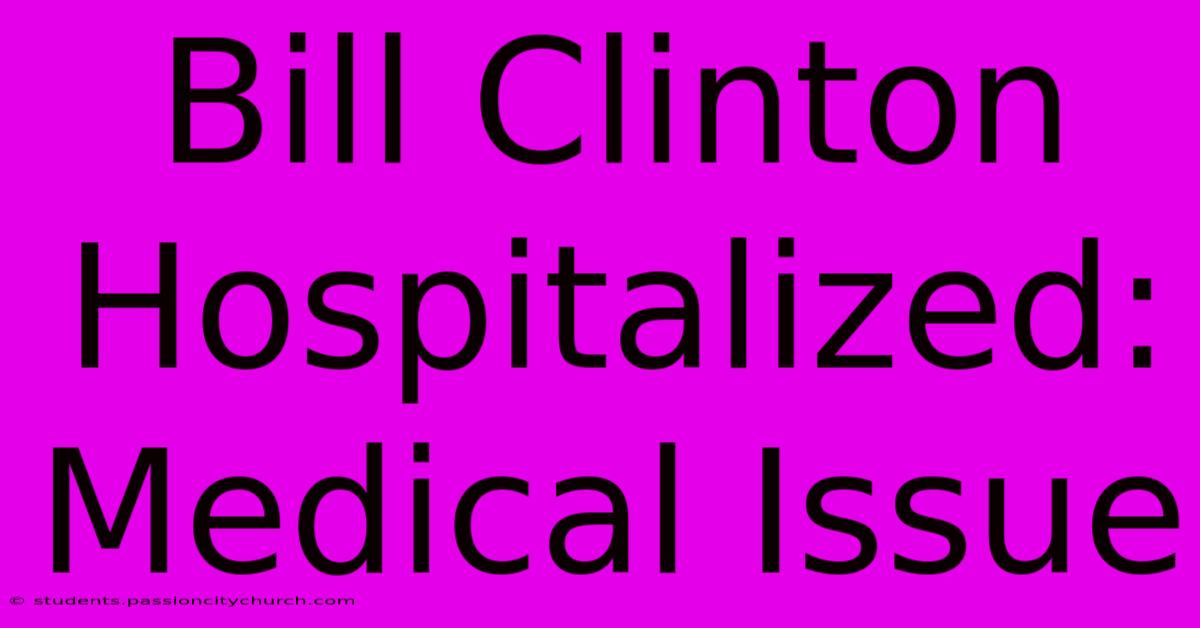Bill Clinton Hospitalized: Medical Issue

Discover more detailed and exciting information on our website. Click the link below to start your adventure: Visit Best Website. Don't miss out!
Table of Contents
Bill Clinton Hospitalized: Understanding the Medical Issue and Its Implications
Former President Bill Clinton's health has always been a matter of public interest. News of his hospitalization, even for seemingly routine procedures, often sparks widespread concern and speculation. This article aims to address the topic of Bill Clinton's hospitalizations, focusing on the medical issues involved, while avoiding specifics that might compromise his privacy or rely on unsubstantiated rumors. We will delve into the importance of maintaining privacy while acknowledging the public's understandable interest in the health of a prominent figure.
Understanding the Challenges of Reporting on Celebrity Health:
Reporting on the health of public figures like Bill Clinton presents a unique challenge. The media's responsibility to inform the public clashes with the individual's right to privacy. While the public has a legitimate interest in the well-being of individuals who have significantly impacted society, it's crucial to maintain ethical boundaries and avoid sensationalizing or speculating about medical conditions without verifiable information. Any reporting should prioritize factual accuracy, verified sources, and respect for the individual's privacy.
The Importance of Privacy in Medical Matters:
The Health Insurance Portability and Accountability Act (HIPAA) in the United States strictly protects the privacy of medical information. Disclosure of a patient's medical history without their explicit consent is a violation of this law. This underscores the importance of responsible reporting and the need for journalists and the public alike to respect the confidentiality of medical records. While news outlets might report on a hospitalization, they should refrain from detailing the specifics of a diagnosis or treatment without explicit consent from the individual or their representatives.
Analyzing Past Hospitalizations and Reported Health Issues:
Throughout his life, former President Clinton has faced various health challenges. Past reports have mentioned instances of heart-related issues, prompting speculation about his cardiovascular health. However, without official confirmation from his medical team, it's irresponsible to draw definite conclusions about the nature and severity of these conditions. Any analysis should rely on publicly available information released by authorized sources, avoiding conjecture and speculation.
The Role of Speculation and Misinformation:
The internet age has amplified the spread of misinformation and speculation surrounding celebrities' health. Social media platforms, in particular, can quickly become breeding grounds for unverified claims and rumors. It's imperative for readers to critically assess information found online, verifying its authenticity through reputable news sources and official statements before accepting it as fact. Unverified claims can contribute to unnecessary anxiety and fear, particularly within online communities.
The Power of Accurate Information and Responsible Reporting:
Accurate reporting on health issues is vital for several reasons. It helps the public understand the complexities of healthcare, it combats the spread of misinformation, and it fosters trust in reliable news sources. When reporting on the health of public figures, journalists should strive for accuracy, avoiding sensationalism and respecting the individual's privacy. Emphasis should be placed on verifiable facts and confirmed information rather than speculation or conjecture.
Beyond the Headlines: Focus on the Broader Implications:
While focusing on the specifics of a former President's health is understandably newsworthy, it’s also important to consider the broader implications. News of a hospitalization can spark discussions about preventative healthcare, the importance of regular checkups, and the challenges faced by aging individuals. It can also underscore the importance of maintaining a healthy lifestyle and seeking timely medical attention.
Conclusion: Balancing Public Interest and Privacy:
The hospitalization of a prominent figure like Bill Clinton inevitably draws considerable public attention. However, responsible reporting requires a delicate balance between satisfying public curiosity and respecting the individual's right to privacy. The media's role is to inform, not to sensationalize. By relying on verified information, avoiding speculation, and adhering to ethical guidelines, journalists can provide accurate and responsible coverage that respects both public interest and the individual’s right to confidentiality. Ultimately, the focus should remain on factual reporting, promoting responsible discussion, and avoiding the spread of misinformation, ensuring a balanced and ethical approach to this sensitive topic. This approach not only protects the individual's privacy but also fosters a more informed and responsible public discourse. We should strive for a media landscape that values accuracy, ethical considerations, and the individual's right to privacy above all else.

Thank you for visiting our website wich cover about Bill Clinton Hospitalized: Medical Issue. We hope the information provided has been useful to you. Feel free to contact us if you have any questions or need further assistance. See you next time and dont miss to bookmark.
Also read the following articles
| Article Title | Date |
|---|---|
| Van Bastens Kritiek Feyenoord Plek 2 | Dec 24, 2024 |
| Norads Santa Tracker Past Present Future | Dec 24, 2024 |
| Giants Lead 2025 Nfl Draft Order | Dec 24, 2024 |
| Nolan Adapts Epic Follow Up To Oppenheimer | Dec 24, 2024 |
| Buehler Joins Red Sox | Dec 24, 2024 |
| 1 Pm Kickoff Cowboys Vs Eagles Game | Dec 24, 2024 |
| Trump Again Wants Greenland | Dec 24, 2024 |
| Caixinha E O Novo Tecnico Do Santos | Dec 24, 2024 |
| House Panels Sexual Misconduct Probe | Dec 24, 2024 |
| 2024 Walmart Christmas Eve Store Hours | Dec 24, 2024 |
